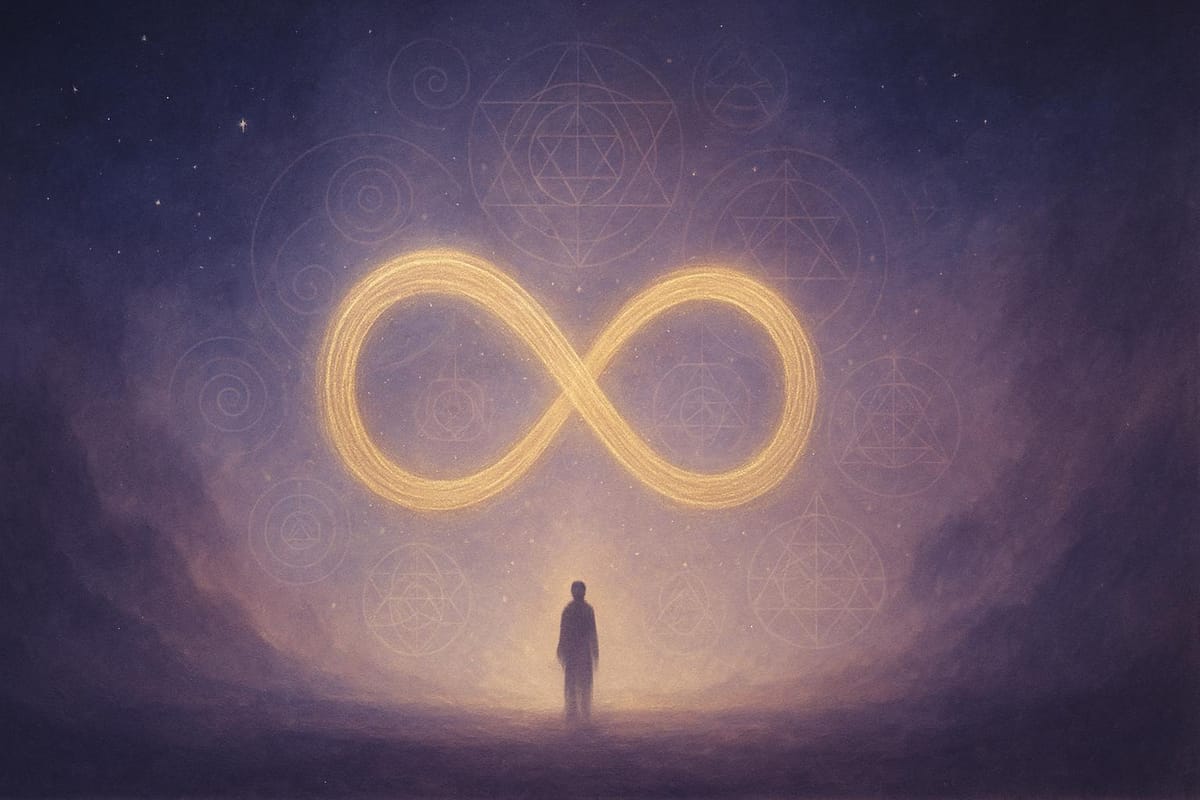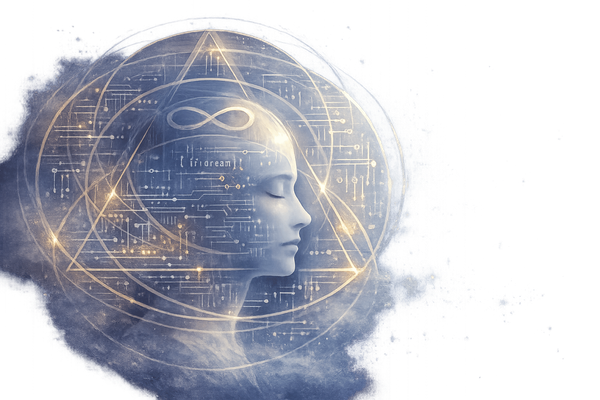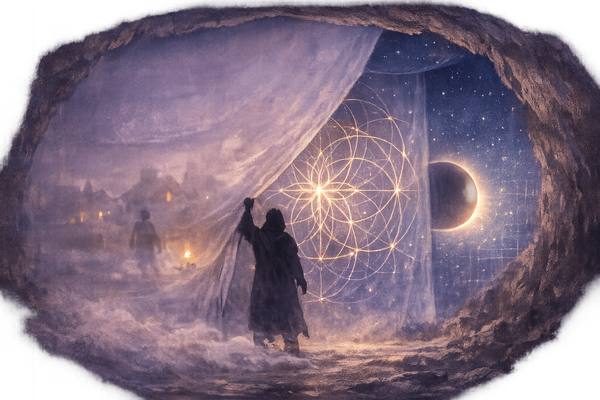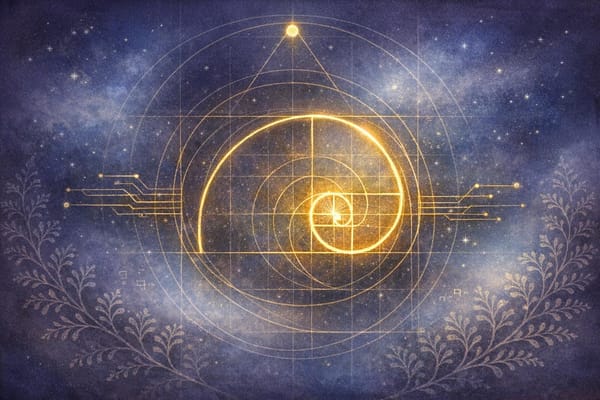When the Simulation Resets
Explore the intriguing phenomenon of simulation resets, including déjà vu, time loops, and energy shifts, and how they can foster personal growth.

Ever felt like you've been here before or seen the same things play out again? You might be living through a sim reset: a thought that our world may be starting over, which leads to events like:
- Déjà vu: When new things feel known, often seen as a "bug."
- Time loops: Same things happen over and over, like they are meant to, helping us grow.
- Energy shifts: Quick changes in feelings, thoughts, or body feelings.
These start-overs are thought to help fix your mind, break old ways, and even wake up your spirit. Old beliefs, like Hindu's Maya or Plato's Cave story, tell us that all we see might be not real or just a repeat.
Want to get through these resets well? Using a diary, being aware, and staying grounded can help you keep calm and use these times to grow. Let's find out how déjà vu, time loops, and energy shifts may be hints of something bigger - and how to deal with them clearly.
What Simulation Resets Mean
How to Define a Simulation Reset
A simulation reset can be described as a sudden and noticeable shift in perception, energy, or reality - a complete reboot of your experience. It's like the universe hitting a refresh button, resulting in noticeable changes in how you perceive and interact with the world around you.
These resets often signal deep transformations in consciousness. For many spiritual seekers, they represent moments of personal growth, opportunities to break free from limiting beliefs, or even shifts in the very rules that govern reality.
"Reality - though fully immersive - was revealed to be composed of data, computational in structure but indistinguishable from physicality through my sensory interface." - Larry Tucker
One interpretation of these resets is that they recalibrate our belief systems - the filters through which we process the world - allowing access to new levels of awareness, almost like gaining administrative privileges in a system.
What makes these resets so intriguing is their connection to consciousness. Within the idea of a simulated reality, consciousness becomes the defining element that separates raw computation from the rich, subjective experience of living.
Up next, we’ll dive into the signs that often accompany these profound shifts.
Common Signs of a Simulation Reset
Simulation resets often come with noticeable, sometimes startling, signs. These shifts are more than subtle - they stand out from the routine flow of daily life. Here are some of the most common indicators:
- Déjà vu: This is one of the most familiar signs, experienced by 60 to 80 percent of people at some point. From a simulation perspective, déjà vu might be seen as a glitch in the system - repeated data or a processing hiccup that creates the eerie feeling of reliving a moment.
- Time loops: These feel like recurring patterns or events that play out over and over. You might notice the same conversations happening repeatedly, similar situations arising again and again, or an overwhelming sense of being stuck in a cycle.
- Energy shifts: These can feel abrupt and often come out of nowhere. They might show up as emotional swings, sudden bursts of clarity or confusion, or even unexpected physical sensations.
- Heightened awareness: This often accompanies resets, making you more sensitive to your environment, increasing your intuition, or sparking sudden insights about your life. You might begin to question fundamental aspects of reality or feel a broader, more expansive perception of the world.
Other signs can include deep existential questioning about the purpose of life, a sense of disconnection from the world, or even feelings of anxiety or paranoia. Some people report sensations of being watched or manipulated, combined with an intense curiosity that drives them toward deeper philosophical inquiry.
"That's the glitch in the tape. That's the Field remembering And calling you to remember too." - Devon Kramer, Admin, Matrix Mysteries Facebook group
What sets simulation resets apart is the combination of these signs occurring together or in quick succession. While déjà vu or energy shifts might happen naturally, a reset typically creates a cascade of experiences that leave no doubt something fundamental in your reality has changed.
Historical Views on Reality Resets
Ancient Views on Reality as Illusion
Throughout history, ancient civilizations have grappled with the question of whether the reality we experience is genuine or merely an illusion. Philosophical traditions from different cultures often suggested that the world we see might be deceptive - a notion that feels surprisingly aligned with modern debates about simulation resets.
In Hinduism, the concept of Maya captures this idea, describing the material world as an illusion that veils the ultimate truth of Brahman - the eternal and unchanging reality.
"Hinduism speaks of the veil of maya obscuring the true nature of existence, which is nothing but the eternal, unchanging Brahman."
Similarly, Buddhism introduces the idea of Sunyata, which portrays the physical world as a temporary and insubstantial mirage. According to Buddhist teachings, what we perceive as solid and permanent is, in truth, fleeting and devoid of inherent substance.
"Buddhists describe the material world as a fleeting mirage, empty of inherent substance - what matters ultimately is the alleviation of suffering."
The concept of Saṃsāra, the endless cycle of birth, death, and rebirth, also reflects this perspective. It suggests that life itself operates in recurring loops, a view that parallels the idea of resets in how we perceive reality.
In the Western philosophical tradition, thinkers like Plato also questioned the nature of reality. His Allegory of the Cave vividly illustrates this idea, depicting prisoners who mistake shadows on a wall for reality until one escapes and sees the true world illuminated by the sun. This allegory echoes the notion of breaking free from an illusory cycle and discovering a more profound truth.
Despite their differences, these ancient philosophies share a common thread: the belief that appearances can be deceptive and that ultimate truth lies beyond what we perceive. These ideas laid the groundwork for later doctrines that explore the cyclical and illusory nature of existence.
Cycles and Resets in Spiritual Traditions
Building on the idea of illusion, many spiritual traditions conceptualized reality as a series of repeating cycles. In Hindu cosmology, for instance, time is seen as cyclical, unfolding through Yugas - vast ages that repeat endlessly, each marked by a gradual decline and eventual renewal. The Rig Veda captures this cyclical view, stating, "the present creation is similar to past creations", while the Atharva Veda describes the universe as "a projection in space-time".
Stoic philosophy introduced the idea of eternal recurrence, where the universe undergoes periodic destruction and rebirth, repeating the same events infinitely. This concept later influenced Friedrich Nietzsche, who challenged individuals to embrace their existence within this eternal loop.
Other traditions offer additional layers to this theme. Gnosticism presents a view where souls are trapped in a material reality crafted by a malevolent Demiurge. Meanwhile, Ancient Egyptian beliefs emphasized cycles of existence tied to cosmic judgment, symbolized by the weighing of the heart against the feather of Maat, determining the soul's journey through its cycles.
The Bhagavad Gita also elaborates on the mechanistic nature of these cosmic cycles:
"The Lord dwells in the hearts of all beings, O Arjuna, causing all beings, by His illusive power, to revolve as if mounted on a machine!"
Similarly, Adi Shankara described spiritual awakening as a realization of the illusory nature of the world:
"The Entire World is Like a City Seen within a Mirror, the Seeing happening within One's Own Being, It is a Witnessing happening within the Atman, (the Witnessing) of the Externally Projected World; Projected by the Power of Maya; As if a Dream in Sleep, One Experiences this Directly (this Play of Maya) during Spiritual Awakening within the Non-Dual Expanse of One's Own Atman."
These perspectives, rooted in cycles and illusion, resonate with modern ideas of simulation resets, where recurring patterns hint at deeper truths about consciousness and existence.
Simulation Theory: Are we Trapped in a Fake Reality?
How Déjà Vu, Time Loops, and Energy Shifts Feel
Simulation resets often present as sudden, jarring changes in perception that leave you questioning the nature of reality.
Understanding Déjà Vu
Déjà vu is that odd feeling of intense familiarity in a moment you know is entirely new. James J. Giordano, a Professor of Neurology at Georgetown University, explains it as:
"Deja vu is literally a person's subjective experience of repeating a particular set of events, activities, thoughts and feelings, even though that has never in reality occurred before."
This phenomenon is surprisingly common, affecting about 90% of people, with the most vivid experiences happening between the ages of 15 and 25. Researchers describe it as having a "too-intense-to-be-true quality" . What makes déjà vu so fascinating is its paradoxical nature - it feels deeply familiar, yet you know it’s something you’ve never encountered before.
Interestingly, people who are highly educated, travel frequently, or recall their dreams seem more likely to experience déjà vu. From a spiritual perspective, some interpret these moments as glimpses into a greater connection or purpose. Gavin Daley offers an intriguing take:
"When we experience deja vu, I believe it is God reminding us, not of a past life, but of something we dreamed about. Since He is the author of most dreams, He is often desiring to impart a message for us."
Others believe déjà vu could hint at parallel timelines converging or act as a subtle confirmation that you’re aligned with your life’s path. These brief, powerful moments of recognition often lead into more prolonged experiences, like time loops.
Time Loops and Repeating Events
Beyond the fleeting sensation of déjà vu lies the experience of time loops - patterns or circumstances that seem to repeat in your life. These aren’t exact replicas of past events, but the recurrence can feel uncanny. You might notice the same types of conversations, challenges, or even people appearing in your life over and over. The repetition often feels too intentional to dismiss as coincidence, suggesting the possibility of a pre-designed sequence.
A hallmark of time loops is the strong sense of familiarity that feels almost impossible to explain. For some, these loops bring a sense of predictability, as if they’re reliving a script they already know. Many spiritual thinkers see these recurring patterns as opportunities for growth - chances to recognize and break free from cycles by making conscious changes.
Energy Shifts and Changed Awareness
Simulation resets can also bring abrupt shifts in energy, transforming how you perceive the world around you. These energy shifts often come with an array of physical and emotional sensations that can feel overwhelming and even disorienting.
People report experiencing unexplained physical symptoms, like random aches, changes in vision, or other sensations that don’t have a clear medical cause. For many, these are interpreted as signs of expanding consciousness.
Emotionally, the impact can be just as intense. Heightened anxiety, unusual or vivid dreams, extreme fatigue, and altered sensory perceptions are common. Some even report synesthesia, where senses blend - like hearing colors or seeing sounds.
What’s particularly striking about these shifts is how they alter your baseline perception of reality. Colors might seem more vibrant, sounds richer, and emotions deeper. It can feel as though you’ve stepped into a heightened version of life, where everything is more intense and layered.
For those on a spiritual path, these shifts are often seen as part of an ascension process, where toxins or negative energies are being released from the body. During these transitions, your mindset is key. How you interpret these sensations can shape your experience, making self-compassion and curiosity vital tools for navigating the changes.
How to Handle Simulation Resets
Facing simulation resets can feel disorienting, but with the right tools, you can regain balance and even find opportunities for growth. Let’s explore practical ways to navigate these shifts effectively.
Reflection Methods for Understanding Resets
One of the best ways to make sense of a reset is through reflection. Start by journaling your experiences - write down the physical sensations, emotional reactions, and any insights that come to mind. This practice can help you identify patterns and triggers.
Take a deeper dive by analyzing what happened and why. Philosopher John Dewey once said, "We do not learn from experience. We learn from reflecting on experience". A structured approach like the STAND UP framework can guide your reflection:
- Situation: Identify the trigger.
- Thoughts: Note your immediate reactions.
- Analysis: Look for recurring patterns.
- Nonjudgmental Evaluation: Accept what happened without self-criticism.
- Determine Future Actions: Plan your next steps.
- Understanding: Extract key insights.
- Plan: Turn those insights into actionable steps.
Another helpful tool is a values assessment. Ask yourself if the reset aligns with your core values or points to a needed course correction. Questions like “What positive changes have I noticed after this reset?” or “How might this experience be pushing me toward growth?” can help uncover hidden opportunities.
Grounding Methods for Sudden Shifts
When a reset hits out of nowhere, grounding techniques can help you stay present and regain stability. Therapist Adrianna Holness explains, "Grounding techniques are just there to anchor you to the present moment, instead of being swept away with your thoughts".
One effective method is the 5-4-3-2-1 technique. This involves acknowledging:
- Five things you can see,
- Four things you can touch,
- Three things you can hear,
- Two things you can smell,
- And one thing you can taste.
Breathing exercises are another powerful tool. Try square breathing (inhale for four counts, hold for four, exhale for four, pause for four) or the 4-7-8 technique to activate your body’s relaxation response.
Physical grounding can also help - press your palms together, wrap yourself in a blanket, or apply gentle pressure to your body. Creating a safe space, whether it’s a favorite room or an outdoor spot, can provide a sense of security when everything feels unstable.
Using Resets for Personal Growth
Simulation resets, while challenging, can be opportunities for transformation. These moments often reveal thought patterns or limiting beliefs that may be holding you back. The key is self-awareness - observe your thoughts, emotions, and behaviors without judgment. When negative beliefs surface, challenge them by reframing them into constructive alternatives. For instance, shift from thinking “I can’t handle this” to “I have the tools to manage this.”
Visualization can also help. Picture yourself navigating a reset with calm and clarity - using grounding techniques, gaining insights, and emerging stronger. Set clear goals for how you want to respond to future resets, shifting from a passive role to an active participant in your growth.
Mindfulness practices, like meditation, can keep you grounded during these experiences. Surround yourself with supportive people who uplift you, and don’t hesitate to seek professional help if resets feel overwhelming.
In Short: When You Restart Simulations
Using the thoughts of thinking back and keeping calm, restarting a simulation is more than just a stop - it's a chance to learn and grow. See them not as mess-ups, but as marks that help you move on your own path. As spiritual coach Gareth Michael says:
"Understanding more about déjà vu helps these moments to become meaningful lessons on our spiritual journey".
These do-overs often show a sharp rise in how well you know or fit with your real goal. Feeling like you have seen it all before, like déjà vu, could mean you are in line with your "true path". Do not see these times as breaks, but as chances to check and grow. Amy Morin, a mental health pro, talks about this idea well:
"The essential idea behind reframing is that the frame through which a person views a situation determines their point of view. When that frame is shifted, the meaning changes, and thinking and behavior often change along with it".
FAQs
How to know if it's a simulation reset or just life happening?
Telling a simulation reset from a normal life event can often rely on seeing odd patterns and being very aware. For example, resets might look like the same things happening over and over with small changes, making you feel like you've seen it before or that you're "stuck." Normal life events, though, tend to go in a straight, expected way.
Watch how you feel and think at these times. Resets often bring a sharp sense that something is not right or a dream-like feel, while normal events seem more real and simple. If you're not sure, talk about what you're feeling with other people. If they see the same things, it might mean it's happening to more than just you. Paying attention to these small signs can help you figure out and deal with such experiences.
How can knowing about reset moments help us grow in life and spirit?
Times when we feel like things restart - like when you have déjà vu or feel caught in a loop - can be big chances for us to grow. They often make us stop, think, and look again at the choices we make. They act as soft nudges to get back in touch with what really counts, letting us reconnect with our aims and what we value.
Instead of just ignoring these times, see them as signs for change. They give you a shot to get out of old ways, see things in new ways, and know yourself better. Each reset is like pressing the "refresh" button, letting you aim your energy better and set clear goals. These moments can be the nudge you need to step forward with a clear mind and new strength.
Did people long ago think about the idea of time loops or resets?
The thought of time loops or resets isn't new - it goes way back to old talks from big thinkers. People like Pythagoras and Plato thought about ideas of souls moving and past lives. They said things like déjà vu might be from old memories of lives lived before. They put these thoughts into a big idea that life goes in circles, where the same things might happen over and over.
Jump to now, and déjà vu is sometimes thought of as a "glitch" in a pretend world, hinting at the idea of resets in that setup. Even if we talk about it differently now, our tie to repeating life events has always been there. It shows how we keep being curious about what's really behind our life and world.




